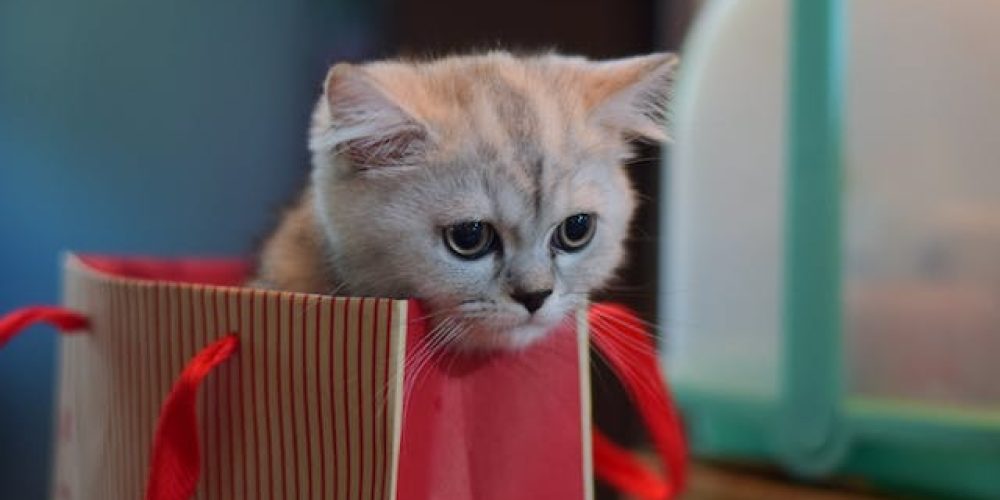It’s the season for twinkling lights, carol singing, and maybe, just maybe, a surprise pet wrapped up with a bow under the tree. But before you embark on a fur-tastic journey, let’s explore the dual perspectives of this paw-some present!
Grinch view: Why you shouldn’t get a pet for Christmas
Firstly, the Grinch might say, “Hold your candy canes!” Bringing home a dog or cat isn’t just a holiday fling, it’s a long-term commitment that lasts as long as your Christmas fruitcake – 15 to 18 years! During this time, your family dynamics might shift more than Santa’s sleigh on a windy night.
Recent reports hint at the challenging reality of pet welfare in the UK, with the cost of living crisis putting pressure on families. It’s not just about the love and belly rubs, it’s about vet bills, premium kibble, and the occasional pet spa day. So, before you decide to gift a pet, make sure your finances are up for the journey.
Santa’s view: The right way to give a pet as a gift
On a cheerier note, let’s unwrap the gift of pets with a sprinkle of holiday magic. Imagine surprising your dear ones with a furry friend, that’s as tailor-made as a Christmas sweater. However, gifting a pet isn’t just about the bow-wow factor, it’s about matching the breed with the receiver’s wishes and lifestyle.

How to choose the right pet for your family
Consider the receiver’s wishes and the breed’s suitability – like choosing socks, finding the perfect pet needs careful thought.
A harmonious furry friendship requires awareness and commitment. Think about the pet’s breed, the living space, the socialisation time and healthcare.
Exercise and playtime:
- Regular walks and play sessions are essential.
- Provide exercise routines based on the energy levels and needs of the specific dog breed. High-energy breeds like Border Collies, German Shepherds, and Labrador Retrievers may require more exercise and mental stimulation.
- Customise play sessions for individual cat breeds, considering their activity requirements. Energetic breeds like the Bengal and Siamese may require more interactive play.
Living space:
- Make sure the living space is suitable for the pet’s needs.
- Adapt the environment based on the pet and breed characteristics.
- Provide outdoor access for dogs that thrive on outdoor activities. Breeds like the Golden Retriever and Siberian Husky benefit from outdoor spaces.
- Consider vertical spaces for cats like the Maine Coon and Bengal since they usually enjoy climbing and high stands. All cats like to have private time, so make sure to provide them with quiet and hiding places.
Socialisation:
- Dedicate time to socialise and engage in playtime.
- Understand and adapt to the social features of different dog breeds. Sociable breeds like the Beagle and Boxer enjoy interacting with other dogs and people.
- Recognise the social preferences of various cat breeds, ensuring a suitable environment for their comfort. While the Ragdoll may prefer a calm environment, the Abyssinian may be more outgoing.
- If you already have pet in the house take care when introducing a new one. Do it gradually, allowing existing ones to sniff and observe from a distance. Supervise their interactions, and provide a quiet space for each to retreat if needed avoiding stress from building up.
Healthcare:
- Consider the commitment to necessary lifelong healthcare
- Budget for routine check-ups and vaccinations.
- Consider breed-specific health issues. Breeds like the Bulldog may need attention to respiratory health. The Persian cat may have eye problems due to its flat face and require frequent grooming to prevent matting of their coat.
In conclusion, before you jingle all the way to the pet store or breeder, consider both sides of the tail. Because when done right, the gift of a pet can be the most heartwarming present of all – a lifetime of love, joy, and maybe a few tangled tinsel messes!

Our Joii vets are here 24 hours a day for any questions you have, even over the festive holidays.
Coming soon…on the twelfth day of Christmas
White Christmas – winter weather issues











